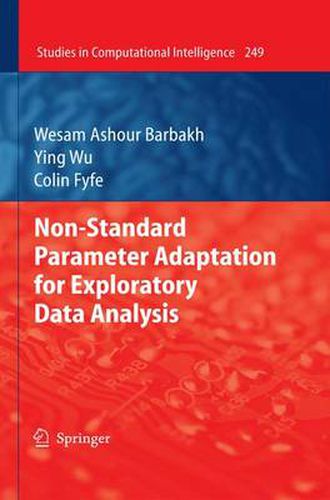Readings Newsletter
Become a Readings Member to make your shopping experience even easier.
Sign in or sign up for free!
You’re not far away from qualifying for FREE standard shipping within Australia
You’ve qualified for FREE standard shipping within Australia
The cart is loading…






This title is printed to order. This book may have been self-published. If so, we cannot guarantee the quality of the content. In the main most books will have gone through the editing process however some may not. We therefore suggest that you be aware of this before ordering this book. If in doubt check either the author or publisher’s details as we are unable to accept any returns unless they are faulty. Please contact us if you have any questions.
Exploratory data analysis, also known as data mining or knowledge discovery from databases, is typically based on the optimisation of a specific function of a dataset. Such optimisation is often performed with gradient descent or variations thereof. In this book, we first lay the groundwork by reviewing some standard clustering algorithms and projection algorithms before presenting various non-standard criteria for clustering. The family of algorithms developed are shown to perform better than the standard clustering algorithms on a variety of datasets.
We then consider extensions of the basic mappings which maintain some topology of the original data space. Finally we show how reinforcement learning can be used as a clustering mechanism before turning to projection methods.
We show that several varieties of reinforcement learning may also be used to define optimal projections for example for principal component analysis, exploratory projection pursuit and canonical correlation analysis. The new method of cross entropy adaptation is then introduced and used as a means of optimising projections. Finally an artificial immune system is used to create optimal projections and combinations of these three methods are shown to outperform the individual methods of optimisation.
$9.00 standard shipping within Australia
FREE standard shipping within Australia for orders over $100.00
Express & International shipping calculated at checkout
This title is printed to order. This book may have been self-published. If so, we cannot guarantee the quality of the content. In the main most books will have gone through the editing process however some may not. We therefore suggest that you be aware of this before ordering this book. If in doubt check either the author or publisher’s details as we are unable to accept any returns unless they are faulty. Please contact us if you have any questions.
Exploratory data analysis, also known as data mining or knowledge discovery from databases, is typically based on the optimisation of a specific function of a dataset. Such optimisation is often performed with gradient descent or variations thereof. In this book, we first lay the groundwork by reviewing some standard clustering algorithms and projection algorithms before presenting various non-standard criteria for clustering. The family of algorithms developed are shown to perform better than the standard clustering algorithms on a variety of datasets.
We then consider extensions of the basic mappings which maintain some topology of the original data space. Finally we show how reinforcement learning can be used as a clustering mechanism before turning to projection methods.
We show that several varieties of reinforcement learning may also be used to define optimal projections for example for principal component analysis, exploratory projection pursuit and canonical correlation analysis. The new method of cross entropy adaptation is then introduced and used as a means of optimising projections. Finally an artificial immune system is used to create optimal projections and combinations of these three methods are shown to outperform the individual methods of optimisation.